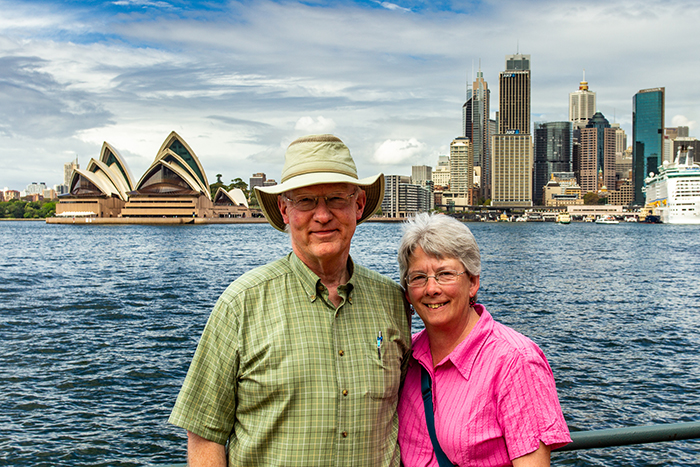Where Passion Meets Purpose

Dave '74 and Sue Stebbins Souerwine '75 during a recent trip to Australia.
Dave ’74 and Sue Stebbins Souerwine ’75 Help Dickinson Launch Data Analytics Program
Dave ’74 and Sue Stebbins Souerwine ’75 had long been loyal supporters of their alma mater, and their generosity has made a discernible difference. But a few years ago, they were looking for a way to get involved that connected their philanthropy with a cause they were passionate about.
For the Souerwines, who met in the only applied-math class at the time during Dave’s senior year, that passion is data literacy. After seeing seismic shifts in their own careers over the decades, they wanted to ensure that all of today’s Dickinson students are well-positioned to meet new opportunities and challenges in a rapidly evolving—and increasingly data-driven—world.
“In the business world or the government world, or anywhere where students are going to end up working, it’s just so critical that they have the ability to take data sets and figure out what the data is telling them to derive strategy and solve problems,” says Dave. “That’s a big lack in corporations.”
The couple saw that passion begin to take shape on campus in 2016, when the college’s Quantitative Reasoning Center launched with their support. In the following years, they frequently heard from students about the positive impact the center was having on campus.
"My experience as a QR tutor has tremendously improved me professionally and personally," Ruby Ngo '22 wrote to them. "I was able to connect with new students, learn from their experience and enhance my knowledge.
Seeing this kind of success, they supported the expansion of the center’s teaching and learning opportunities. More recently, the Souerwines played a key role in the development of Dickinson’s new data-analytics major.
From Challenge to Department
The idea for the program germinated a few years back, as the Souerwines discussed ideas for the future of the Quantitative Reasoning Center with several Dickinson mathematics professors. When the couple asked the professors if the college planned to offer a data analytics curriculum, that led to further discussions about what was currently offered and what could be developed. And when the college’s Revolutionary Challenge kicked off in 2019, calling for Dickinsonians worldwide to submit their ideas for the college’s next big initiatives, a group convened to draw up a proposal, informed by input from Dickinson students, faculty members, alumni and administrators as well as by the work of experts across a variety of fields.
The Souerwines asked the proposal team to keep them updated on the burgeoning data analytics program initiative, and they frequently weighed in. When an opportunity arose to fund some of the early work to make the new program possible, the couple enthusiastically stepped forward.
Last December, the data-analytics initiative proposal was one of four Revolutionary Challenge finalists to be endorsed by Dickinson’s President’s Panel on Innovation and the Board of Trustees. The college’s data-analytics program launched last spring.
“I think Dickinson offering a major and a course of study in this area is transformational for the college, and it will be a huge advantage for students to study in that area,” says Dave, who used data-driven decision-making in his own medical-device and technology career. “We’re thrilled with the way it ended up.”
A Passion-driven Movement
The Souerwines are among a growing contingent of philanthropically minded citizens—at Dickinson and globally—who are driven to give back in targeted and personally meaningful ways. In addition to giving back as members of the John Dickinson, Mermaid and Old West societies, the Souerwines feel that, for them, working closely with staff members to find ways to connect their philanthropy with the things they care about most has amplified the joy that making a difference can bring.
“It was wonderful to be able to donate money and see it have a positive effect at the college, as opposed to just randomly giving some amount of money every year,” says Sue.
“If you have a passion for a particular area within the college, the college is very receptive to having alumni involved, and certainly in hearing your point of view and what it is that you would propose doing,” Dave says. “It feels good to be engaged, and when we hear people talk about the impact it has had on them, and what they’ll be able to do with it in the future, it’s a wonderful thing.”
TAKE THE NEXT STEPS
Published July 13, 2021